 As I look ahead to tomorrow’s readings, it strikes me that many of us will be privileged to encounter a beautiful passage of scripture twice in one day: Hear, O Israel! The LORD is our God, the LORD alone! Therefore, you shall love the LORD, your God, with all your heart, and with all your soul, and with all your strength. Take to heart these words which I enjoin on you today. Drill them into your children. Speak of them at home and abroad, whether you are busy or at rest. (Deuteronomy 6:4-7) As one who prays the Liturgy of the Hours, after hearing these timeless words at morning Mass, I will receive them again as I pray Night Prayer. It is with good reason that this passage, known as the “Shema,” is held as a key text by Jews and Christians alike. Like our ancestors in faith, you and I are reminded this weekend, to keep the Great Commandment of love before us always. We are called to keep it before us always, whether busy (doing dishes, laundry, or paperwork) – or at rest (spending quiet time in prayer or crawling into bed at night). I don’t know about you, but I have a way to go in this regard!
0 Comments
I walked by chapel earlier and saw that no one was signed up to read at Mass tomorrow. Since I haven’t done this for a while, I decided to sign up.
Later, when I sat down for my daily time of scriptural prayer, I thought it would be good to use the readings for Wednesday since I may not have a chance to prepare later. (When I work in our infirmary until 10 p.m., it impacts my morning schedule.) To my delight, I quickly realized that the first reading was the story of Elijah and the prophets of Baal. I was happy that I would be able to do this reading at Mass tomorrow. It’s a story that I have long enjoyed, for some reason. In case you don’t remember, this story from 1 Kings recounts a time when the people of Israel were wavering in their faith; they were undecided between following God and worshipping the idol of their neighbors. Against the odds, Elijah’s contest against the prophets of Baal proves overwhelmingly who is the true God. Fire consumes his offering, despite everything having been drenched with water. This episode in Israel’s history is a reminder to us that, no matter how bleak things may seem, God will be victorious. As tomorrow’s responsorial psalm reminds us, He is our hope on Whom we rely for everything. Even when, humanly speaking, we can't see a way forward, we are reminded here of who can make a way and turn our losses into victory. “For the Son of Man did not come to be served but to serve and to give his life as a ransom for many." (Mk. 10:45)
This verse from our gospel reading this morning has long stood out to me as a poignant one. In reflecting on this passage, I was struck by what transpired. Although Jesus was thinking and speaking about His upcoming torture and terrible death, He was able to address a situation with His apostles who were thinking about honors in the coming kingdom. I don’t know about you, but when I’m faced with great suffering, I don’t think I tend to be very attentive to other people. I am not eager to patiently go beyond myself and help them in such circumstances. Here, though, Jesus is patient with His followers and even teaches them an invaluable lesson about selfless service. In today’s gospel, we too are reminded that our lives are about serving others more than about what others can do for us. May we be touched by Jesus’ example of love and selflessness and strive, with His help, to put it into practice. May we strive always to serve and give our lives back to Him in thanksgiving. 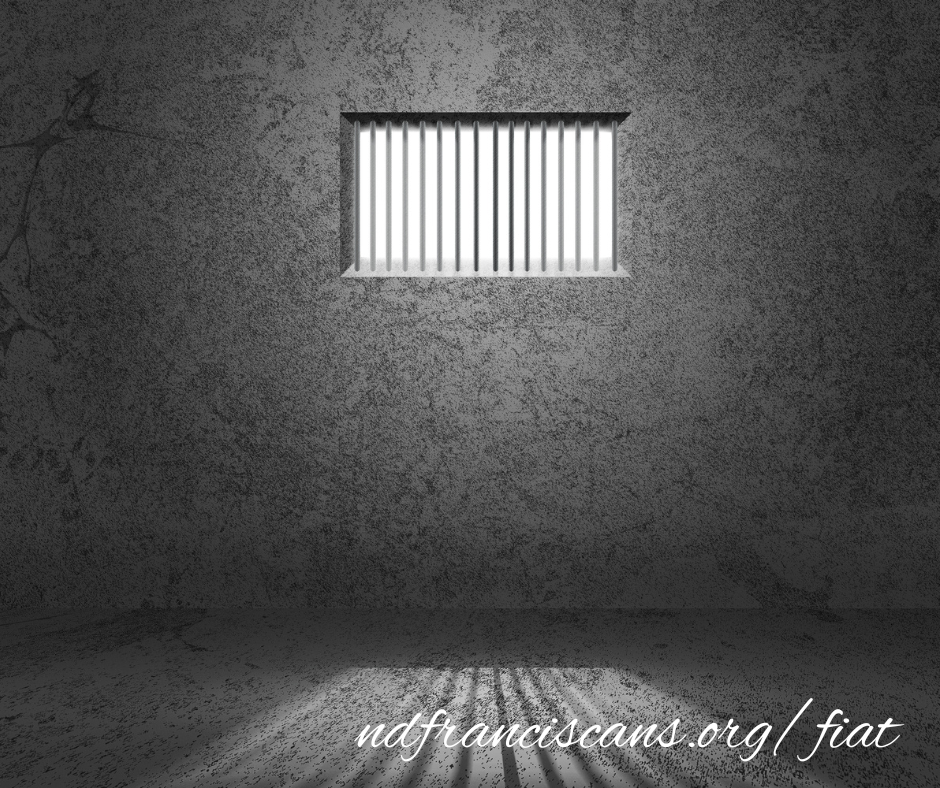 Today’s reading from Acts continues the theme from last week’s reflection here about unlocked doors. St. Luke’s description here is quite vivid. As I read it, I find myself picturing the scene in that Philippian prison two-thousand years ago. I can almost see Paul and Silas there, singing hymns at night. I imagine the scene of the jail shaking and the doors flying open. I almost cringe as I read the words about the soldier, as the picture of a uniformed man unsheathing his sword in despair, comes before my mind’s eye. Thankfully, Paul’s voice catches him in time, and the story takes a positive turn as we learn of the soldier’s subsequent hospitality, care, and conversion. What started in the darkness and uncertainty of that night ends in a bright new day of hope, joy, and new faith. A lot happened within the course of the night! As the days of this beautiful Easter season speed so quickly past us, I pray that our faith, which has been thus renewed, may bear fruit in our lives in the world today. You and I probably won’t convert a soldier or be miraculously released from prison, but I suspect that Our Lord has a mission today for each of us. As we pray for the coming of the Holy Spirit, perhaps one of our intentions might be that He would help us to be open to that mission and attentive to His promptings. This morning’s reading from Acts recounts the Apostles’ miraculous departure from prison “during the night.” By early morning, they were back to their task of teaching in the temple as charged by the angel.
As I write this, I am nearing the end of my second consecutive night of working the 10 to 6 shift in our infirmary. By early morning (after lauds and Mass), I hope to be napping! 😊 I wonder if the apostles were tired after their less than restful night, or if their excitement and enthusiasm for spreading the Good News drove out any feelings of fatigue. In another account of imprisonment in the Acts of the Apostles (16:25), we hear of Paul and Silas spending their nocturnal hours in prayer and hymn-singing. It feels a bit backwards, when beginning the night shift, to say prayers like: “…watch over us when as we sleep” or “…grant us a restful night…” It almost seems like I should switch these two “liturgical hours,” praying morning prayer at 10 p.m. and compline close to 6 a.m. Nonetheless, whether I am sleeping normal hours or working through the night, I know that my heart should be lifted in praise, like the apostles’, to the one who knows “my resting and my rising” (Ps. 139). When I work until 10 o’clock in our infirmary, I find it hard to get up at my preferred rising time to make it to chapel for a full hour before lauds at 6:30 a.m.
Consequently, this morning, I made my meditation after Mass instead of before. I heard the readings given us for this Wednesday of the 2nd Week of Lent. Lately, I have been going through a list of scripture passages which were suggested to me for prayer, but this morning’s gospel from Matthew struck me. I decided that I would use it, instead, for my scriptural prayer. “As Jesus was going up to Jerusalem, he…said to them on the way, ‘Behold, we are going up to Jerusalem, and the Son of Man will be handed over to the chief priests and the scribes, and they will condemn him to death, and hand him over to the Gentiles to be mocked and scourged and crucified, and he will be raised on the third day.’ ” (Matt. 20:17-18) What struck me today was that Jesus knew what awaited Him. He knew a horrendous death and untold sufferings were in store for Him in Jerusalem. Yet, He was going there freely. What courage and love this must have taken! I realized that I, on the other hand, do not know what my “cross” will be, this day or in the future. I do not have the courage or strength to meet it on my own. Thankfully, I can ask strength and courage from “our brave shepherd,” as the liturgy calls Him (Collect of the Fourth Sunday of Easter). Today’s gospel provides us with beautiful inspiration as we strive to follow the One who “did not come to be served but to serve and to give his life as a ransom for many.” (Matt. 20:28) What an example we are given! May we always take up the crosses that come to us with the love and courage He provides! The opening line of this Sunday’s epistle is one that makes my heart take a little leap! Paul tells us that “the sufferings of this present time are as nothing compared with the glory to be revealed for us.”
Wow! I don’t know about you, but I feel like I’ve had a fair share of suffering in the last few years. From dealing with the manifold affects of a pandemic to workplace struggles to everything in between, the beginning of this second decade of the century hasn’t exactly been a breeze. There isn’t a time in history, though, that’s been immune from suffering, unless maybe you count the time before Adam and Eve made a world-shattering decision. So, suffering is part of life for everyone, but that’s not my point. The striking part is that, here, Paul is teaching us that despite how burdensome our current sufferings may seem, God’s plan is for something far greater. Even if we feel like we’re in an abyss of sorrow, His plan for us in heaven goes to the opposite extreme - and beyond. Now, that’s encouraging! Later in his passage, Paul brings in the image of a woman in labor, which fits in well with the above reflections. I’ve never been in labor, but the analogy of creation groaning in labor pains makes sense to me. It strikes me because a couple of people I was with were recently discussing the pains of childbirth and how their memory is soon overshadowed by the joy of a new life among us. I hadn’t realized that this poignant passage was in Romans, chapter eight, but I guess it shouldn’t come as a surprise. This chapter, which comes right in the middle of the letter, is really a treasure-house of scriptural gems. Perhaps my favorite passage in the entire Bible comes a little later in the chapter, in verses 35-39, where Paul ponders over the power and steadfastness of Christ’s love: “What will separate us from the love of Christ? Will anguish, or distress, or persecution, or famine, or nakedness, or peril, or the sword?…No, in all these things we conquer overwhelmingly through him who loved us. For I am convinced that neither death, nor life, nor angels, nor principalities, nor present things, nor future things, nor powers, nor height, nor depth, nor any other creature will be able to separate us from the love of God in Christ Jesus our Lord.” 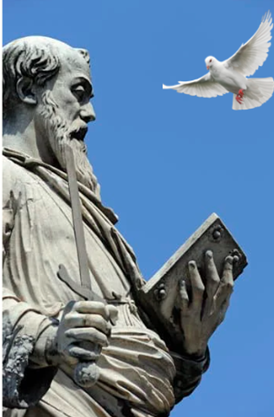 In praying with this morning’s readings, a couple of points in the passage from Acts stood out to me. The letter and exhortation from the first council of the Church, that of Jerusalem, among other things instructed the gentile Christians to abstain from the meat of strangled animals. I couldn’t help but wonder why this was considered important. There are some different explanations offered for this, but I guess, of greater importance is the other point that really struck me. According to the comments of “the apostles and presbyters” in this important gathering, the reason for this session was to restore the peace of mind of the gentile believers who had been upset by other teaching and whose peace had been disturbed. The Council met to determine what should be required of these converts, and they settled on some minimal requirements. I found it interesting that this Church directive (if you follow my logic here) was given to restore peace. Wouldn’t it be great if more people today saw Church teachings as instruments of peace, as given for our welfare, rather than seeing them as restrictive or in a negative light? During these days as we prepare for Pentecost, might one of our prayers be that the Holy Spirit would enlighten more hearts with an appreciation for the Church’s motherly guidance for our lives? Another prayer might be that each of us, by our gentleness and kindness, as friends of Christ, might be instruments of His peace to hearts that are troubled.  Oh, Psalm 139! I was blessed to be able to read it at Mass today. I had memorized much of it back in college, when I was accustomed to praying the Little Office of the Blessed Virgin Mary. For me, this psalm is a special scripture passage. It touches and warms my heart. I really like a couple of the hymns which have been adapted from it, such as “O God, You Search Me” and “You are Near.” (We actually sang the former this morning at Mass.) Amidst the struggles of life, it is wonderful to remember the message contained in this psalm. If you’re having a tough day, or are in need of a reminder of God’s closeness, I’d encourage you to take a few moments and reflect upon this beautiful passage. It wasn’t just relevant 3,000 years ago; it’s “living and effective” today as well. O LORD, you have probed me and you know me; you know when I sit and when I stand; you understand my thoughts from afar. My journeys and my rest you scrutinize, with all my ways you are familiar. Where can I go from your spirit? From your presence where can I flee? If I go up to the heavens, you are there; if I sink to the nether world, you are present there. If I take the wings of the dawn, if I settle at the farthest limits of the sea, Even there your hand shall guide me, and your right hand hold me fast. Truly you have formed my inmost being; you knit me in my mother's womb. I give you thanks that I am fearfully, wonderfully made; wonderful are your works. I know it’s been a number of weeks since I’ve posted any reflections here. I’m sorry, but I guess I’ve been busy and also not had much inspiration.
As I embark on the final stretch of a fifteen hour stint at the reception desk, I realized that it’s been a while and that, perhaps, I’d better come up with something. Glancing at the USCCB’s daily readings webpage for inspiration, I saw that tomorrow’s selection is again from Ecclesiastes. Skimming the words: “There is an appointed time for everything…A time to be born, and a time to die; a time to plant, and a time to uproot the plant. A time to kill, and a time to heal…a time of war, and a time of peace,” I was struck by their timeless beauty. The truths proclaimed thousands of years ago are no less relevant today. In this time when I, for one, face so much added stress and uncertainty, it’s good to remember the lessons contained here. In times of weeping, mourning, dying, uprooting, killing, tearing down, scattering, not embracing, losing, casting away, rending, hating, and war, I need to keep my gaze directed upward. It’s so easy to get caught up in the turmoil around me, on the storm. I need to strive to keep my attention on the One who’s “got it all” and who can calm the storm with a single word. Whether he decides to end the tempest suddenly or chooses to walk with me through it, I need to entrust myself and my situation to Him, asking Him to stay close to me through it all.  This morning’s gospel reading about the call of St. Matthew resonated with me on a personal level, as I sat in chapel. I had planned to sleep in, after working a third night shift within a week’s time, but I woke up and was wide awake; my clock told me it was close to 5:30 a.m. This morning’s gospel told of how Jesus called Matthew, the tax collector, from his post. This was the beginning of a whole new life for this former government employee. You could say, he “did a 180.” I, too, have experienced a turnaround recently, and not just in my sleep schedule! I’ve been having a hard time lately, facing various challenges; it’s been a tough stretch. Yesterday, though, an unexpected conversation with our administrator was a game-changer. Some issues were covered, and I came away with a fresh outlook on life. With a special grace from above (yes, I’ve sure been praying), I did a 180! Often the work of our Divine Physician, who came “to seek and save what was lost” is accomplished through the simple things of life, even in something as unpretentious as good communication.  This morning, I went into the office I use to check on my seedlings, and turn on the grow light. Haphazardly, I decided to check on the cucumber seeds I had planted last week. As I lifted the lid of the small plastic container I had planted them in, I was shocked to see that, not only had they already germinated, but they were a couple of inches tall. It was as if they were saying, “Hello – here we are.” As I write this, I am reminded of the gospel passage (Mark 4:26-29) which says: This is how it is with the kingdom of God; it is as if a man were to scatter seed on the land and would sleep and rise night and day and the seed would sprout and grow, he knows not how. Of its own accord the land yields fruit, first the blade, then the ear, then the full grain in the ear. And when the grain is ripe, he wields the sickle at once, for the harvest has come.” It is truly amazing how, year after year, from tiny little seeds, plants grow up and produce a bountiful harvest (we hope!). This is just a reminder, as 1 Corinthians 6 says, that “God gives the growth.” 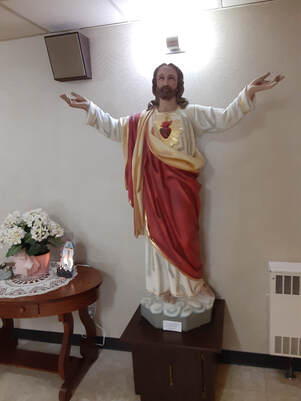 During this Easter octave, I’ve been struggling to wrap my mind around some of the mystery that we’ve entered into: that of the resurrection. I know that this isn’t possible, but, still, the brain tries to make sense of it. I guess I’m not alone in this. Those first disciples struggled, too, when faced with the mystery of our risen Lord’s presence. His questions to them, “Why are you troubled? And why do questions arise in your hearts?” (Luke 24) could well be asked of me and of you. So often, we fail to grasp what Christ’s risen life means in our own lives. We become troubled. We fail to recognize Him in the many little details of our lives. On that first Easter Sunday, as reflected in today’s gospel, Jesus helped his followers recognize Him by a couple of different means… He broke bread. Although I am unaware of any evidence that the two who travelled with Jesus to Emmaus were present at the Last Supper, somehow His gesture of breaking bread “opened their eyes.” Perhaps, they had been there at the feeding of the multitude, who knows! A second gesture that was meant to give light for those bewildered followers of His was the showing of His hands and feet. Jesus had to point out to them that He was not a ghost. He further illuminated this point by eating a piece of baked fish. (That happens to be on the menu here tomorrow, but I will have to pass on that opportunity for imitation as I cannot stomach it!) Today, each of us might take a moment to ponder how Jesus is showing Himself to us in our lives, asking Him for light and responding in gratitude. We will not see His wounds or watch Him break the bread, but, surely, He is with us always, until the end of the age, as He promised.
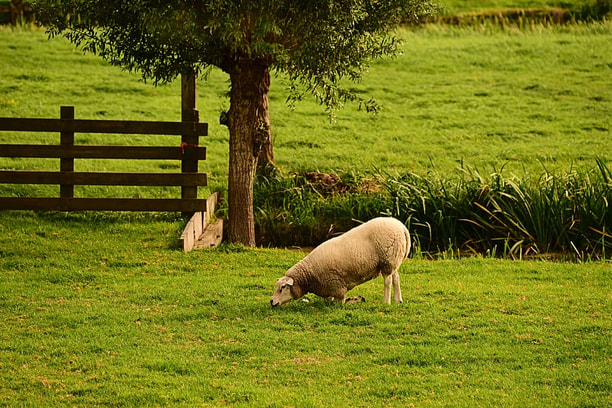 I have a fairly busy day here once I get off from my “regular” work at the front desk at 1:30 p.m. I have reading hour for our residents at 2, apples to cut up, and, if I get time, a little cleaning to do. We’ll see how far I make it. My time is limited because, besides the above-mentioned tasks, I have plans later in the afternoon as well. Confessions start at 4 p.m. at the local church. I’ll try to make it up there by around that time. Then, I’m scheduled to read at the evening Mass; I guess I’ll stay out of trouble today! Before reading this evening at Mass, I wanted to take time to reflect on the scriptures. So, this morning, before coming to work at the front desk, I used them for my meditation time in our chapel. I had also read them over last evening at suppertime, as we were talking about plans for the Sunday liturgy. I must say, I enjoyed the little hint of ‘attitude’ and feistiness that I read between the lines in Amos’ conversation there. He was talking with the priest who didn’t want to deal with a prophet. It seemed as if Amos was saying: “Hey! I never asked for this job! Don’t pick on me! I was minding my own business with sheep and sycamores. (Where do you think you get that nice wool and all those figs from?) God called me to prophesy – I didn’t start on my own, or take it upon myself to speak up. If you’ve got a problem with the message, you’d better take it up with Someone else, and I wouldn’t mess with Him!” Might his response remind each of us of our life’s mission, and also call us to look at our motivation for certain things we do? Could it serve as an invitation to look back on our own calling from God to our individual vocations or ministries? I think so. It might also call us to be open to people that we would like to reprimand or confront. Maybe God has placed them on our path for a reason!  In past months, I’ve had ample cause to ponder the topic of love vs fear (inspired by 1 John 4:18). Without too much ado, let’s just say that I’m a firm believer in balance and in taking a holistic approach, something that seems to have become somewhat counter-cultural in the past fifteen months… In recent days, though, I’ve seen progress; I’ve seen signs of the triumph of love! On Sunday, my absolutely favorite feast of the liturgical year, Corpus Christi, we had Mass in our chapel. It was absolutely wonderful! We hadn’t been able to worship together there for a long time. At the end of Mass, we even had our own Corpus Christi procession through the halls here. The weather was threatening to rain and indoor walking posed less challenges for those with limited mobility, so we decided not to go outside for it. The day before, as I brought things back from the other wing (where we’d been having Mass) and put them in their rightful places in our chapel, tears welled up in my eyes. There was such a sense of joy, restoration, and peace! It certainly will be a weekend to remember. There were other blessings as well, but I won't go into all the details. There were some less-than-desirable occurrences as well, though. I ended up going into urgent care for my elbow, which had become infected after a bike accident Friday morning. When one of the residents here heard about it, he said, “I hope that doesn’t stop you from riding a bike again.” I assured him that it wouldn’t. I will reconsider certain choices (such as taking the dog along on a leash), but I won’t let fear ruin my enjoyment and exercise.  This morning, at our online discussion group, when covering tomorrow’s readings, as we do every week, a phrase from the first reading stirred my heart as it often does when I read it: There is no salvation through anyone else, nor is there any other name under heaven given to the human race by which we are to be saved.” (Acts 4:12) It also reminded me of a beautiful song about the Name of Jesus. This message, proclaimed by St. Peter over 2,000 years ago is timeless. As I thought more about this, I realized how pertinent this message is for us today! As we eagerly wait for an end to this pandemic and the craziness surrounding it, I am reminded that, in the end, nothing else will save us but the Name of Jesus. Don’t get me wrong, I’m not knocking the efforts of the scientific community and the government. These have their place. However, I think this passage today serves as a reminder, a call, to redirect our trust, to refocus our hearts. As we hope for better days, we don’t focus on the numbers, we don’t trust in vaccines or treatments. Also, we need not become entrenched in fear and discouragement at all the unrest around our country and world. Instead, we trust in Jesus, in Whose Name we find salvation. I’d invite you to pray with me the Litany of the Most Holy Name of Jesus, which invokes Jesus using many beautiful titles for Him. Let’s turn to Jesus, bringing Him all the world’s problems and our own. I especially like to do this at the Mass, placing everything on the altar to be brought into His sacrifice made present there.  This morning, I was reading for Mass. After the first reading, I glanced down and saw the words of Psalm 95. Due to extenuating circumstances, I hadn’t prepared the readings. On looking at the familiar passage, it was all I could do to keep from singing the psalm! Due to my work schedule, I’d missed singing the responsorial here this past weekend, so I felt musically deprived. The musical setting I know for today’s psalm is so beautiful! Come, let us sing joyfully to the Lord, let us kneel before the Rock of our Salvation,; let us come into His presence with thanksgiving; let us joyfully sing songs to Him. I guess, in a way, this psalm, with its exhortations to ‘sing to the Lord’ was especially appropriate today. As we waited for Father, we spontaneously decided to sing a couple of hymns. After “Amazing Grace” and “Be Thou My Vision,” it was time for Mass! It was so good to sing together again. We hadn’t had Mass here as regularly of late, and this form of “praying twice” (to use a phrase attributed to St. Augustine) felt so good to have here again! This beautiful psalm was also appropriate on a deeply spiritual level. As Father mentioned in his homily, it referred to the hardening of one’s heart. He reminded us that this is a danger we should be aware of and pray against. “If today you hear His voice, harden not your heart!” The past few months have been a bit challenging for me, and countless others, I'm sure.
I was down for the count in mid-December, and still have some lingering issues. Along with periodic sore throat, continued fatigue still plagues me, though it is better than it was. So, whereas I used to get up often at 5:15 a.m., allowing for an hour of prayer to start off my day, these days, I end up pushing off my rising time about an hour, just barely sneaking into chapel before our Morning Prayer of he liturgy of the hours. I fit in the hour of privite prayer called for in our constitutions before the day is over (sometimes in pieces), but it's just not quite the same as starting the day with prayer. I loved coming into our chapel, in the quiet stillness of early morning, when no one else was there yet, and praying through the day's Mass readings, etc. I guess I shouldn't say that "no one else was there," because the One who goes before me (Deuteronomy 1:30, Psalm 139:5, Isaiah 52:12) is already there "waiting," you might say. Last night, for some reason, I thought of this and it hit me: "I miss our early morning visits." My days felt more grounded when I started them with this extended time of prayer. Maybe, this time of reduced energy has given me an even greater appreciation for these quiet times. When I was home with my mom, I didn't have as much of a chance to pray before the Blessed Sacrament. This deficiency, too, in its own way, can deepen my appreciation for the immense blessing of having Jesus physically present with us in our convent and at our workplace. Writing this is a reminder to me to be more grateful for this enormous gift. Hopefully, before too long, I'll be able to resume early morning visits with a renewed appreciation for them! 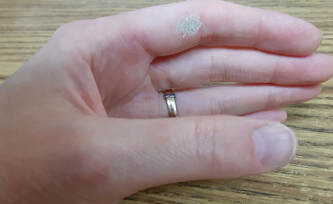 A week and a half ago, I spent some time in the afternoon (after finishing my shift at the reception desk and attending resident care conferences) cutting up some bread. We had received a large donation of day-old Panera breads of all kinds: sour dough, cinnamon-sugar glazed, and more. After advertising it to our staff (for them to help themselves) and taking some for our kitchen’s use, there was still quite a bit left. Two viable options (besides just sticking it all in the freezer) arose for me. Croutons and bread pudding could both be made out of leftover bread. I ended up making some of each, using sour dough loafs for the former and cinnamon-sugar glazed bagels for the latter. Unfortunately, though, the project left a tender blister on the forefinger of my left hand. (Yes; I am a lefty.) Finally, I noticed this morning that it has really started to heal. The now crusty area is actually shrinking a little. It sure was sore for a while, though! I think of this after hearing and reflecting upon the gospel reading this Sunday as well as a poem that was shared from a funeral of a Sister we know. The poem was about “The Hands of a Sister.” It chronicled some of the different types of work religious Sisters have traditionally done: forming and teaching little children, caring for the sick, etc. Some of the deeds described there were not ones that I am called to engage in. Nonetheless, it made me think about my hands and what they do on a daily basis. I pray they may always serve in a way pleasing to Our Lord. I think this Sunday’s gospel (about the servants entrusted with varying amounts of money) fits with this reflection, also. Like these servants, each of us will be called to give an account for how we used what was given to us, what our “hands” did with the gifts we received. I hope and pray that, like the first two servants, at the end of our lives, each of us will have a good return to show on God’s investment in us. However, as I write this, I can’t help but think about St. Therese of Lisiuex’s reflection on empty hands: “In the evening of life I shall appear before you with empty hands, for I am not asking you, Lord, to count my works.” Her humble, trusting attitude is something for us to really think about and seek to emulate. While my hands are engaged in the humble work of cutting up old bread, washing out a resident’s support socks, or taking someone’s temperature, my eyes (inspired by the Little Flower) can be fixed in trust on Jesus.  These words from this morning’s responsorial psalm seem especially appropriate in November of 2020. Times are uncertain; that’s for sure. Just now, one of our staff had to leave work unexpectedly…I guess I’ll be filling in this evening as an aide. (The earth’s ‘shakiness’ has hit closer to home since I began typing this.) If you haven’t done so already, I’d encourage you to take a moment and read this beautiful psalm (46). We all know and have heard about God’s omnipotence, omniscience, and omnipresence. However, it’s good to be reminded of the implications this theological doctrine has in our lives today. Despite rising CoronaVirus case numbers, election issues, and everything else we’re facing, God still “is our refuge and strength, an ever-present help in distress.” Turning to Him for support, we need not fear, “though the earth be shaken or the mountains fall into the depths of the sea.” Currently, I’m reading a book about mercy. It includes passages from St. Faustina’s diary and encouragement to pray the Chaplet of Divine Mercy (as well as to practice the works of mercy). At this time, which can stretch our faith and trust, I think it is especially appropriate to pray this powerful prayer: for ourselves, for our nation, and for our world. It is also good to remind ourselves to keep our eyes on Jesus. If we do this, the earth’s ‘shaking’ shouldn’t get to us as much.  As I sat in chapel yesterday morning, reading over the scripture readings for Mass, one phrase especially struck me: "...he chose us in him, before the foundation of the world..." This passage from Ephesians (1:1-10) explains how God our Father chose us in Christ to be holy and without blemish. This whole reading is worth pondering, but that would be a topic for another article. I'd like to go back to the titular phrase of this post: "Before the foundation of the world." Isn't that amazing to think about? According to a quick Google search, our planet is about four and a half billion years old! That's nine zeros (well, actually 8, with the five in place of one of them)! Can you imagine how long that is? If you and I perhaps live to be 80, which seems to be about the average life expectency nowadays, our planet's foundations would have been laid 56,250,000 lifetime's ago! Holy macro! God has had us in mind for a long time! He's had a long time to figure things out. Actually, that's not quite right, I think He's had a plan all along. So when things aren't going well, when things look dark, I can find consolation in this. I can remind myself of this; He has a loving plan for our good. I am reminded of a scripture verse which articulates this message well. It was etched in my memory by a youth group trip a number of yeaers back: "For I know well the plans I have for you, says the Lord, plans for your welfare, not for your woe, plans to give you a future full of hope." We went around the group (probably on the bus), inserting the name of each person into the passage, ending with an enthusiastic "Jeremiah Twenty NINE Eleven!" It is beautiful and touching to realize that God's loving plan for my life preceeded the very foundation of the world. Today, now, as we honor St. Margaret Mary (known for the revelations of the Sacred Heart), I gratefully recall the words of Psalm 33: "the plans of his heart [stand] from age to age."  Oh; what a week I’ve had! It’s been Crazy, with a capital C! A situation came up for me last Thursday (without going into detail) where I felt I was being treated both unjustly and without good common sense. It has continued all week, unfortunately. While I’ve been struggling with feelings of anger, and trying to sort through things, Sunday’s readings have definitely given me a strong nudge away from harboring a grudge. (I’ll have to keep working at this!) The first reading from Sirach exhorted: “Forgive your neighbor’s injustice; then when you pray, your own sins will be forgiven.” Then the gospel of the unforgiving servant drove the message home. Monday’s feast of the Exultation of the Holy Cross shed even more light on this lesson of forgiveness: If Jesus, hanging on the cross, cried out: “Father, forgive them; they know not what they do,” how can I harbor a grudge against others, whose offense dims in the light of all that Christ suffered for us! Yet, at the same time, I know He understands my pain, my situation. He is with me when I feel angry. Also, he’s carried it all already. At Monday’s Mass, after communion, I sang the beautiful chant “Adoramus Te, Christe,” having committed it to memory during Holy week a couple of years ago. The words that really touched my heart now where: “redemesti mundum,” “[because by your Holy Cross] You have redeemed the world.” At Mass, I am able to offer this suffering, this feeling of injustice, this frustration, united to the cross of Christ. It is wondrous to realize that “he’s got this!” This crazy situation in the world, and in my life, is already incorporated into His paschal mystery. No matter how dark things may look, we can remember that he has redeemed the world. Adoramus Te, Christe! Our Lady of Sorrows, Help of Christians and Cause of our Joy, please pray for us! 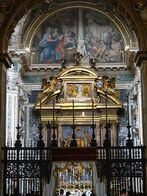 In doing a little research for this post, I realized that the titular phrase refers to air rather than water, being from the air force hymn. Oh well, for some reason, this patriotic song popped into mind while I was swimming this afternoon. (I suppose a musical program from the recent Fourth of July holiday probably had something to do with it.) I now have a standing invitation to use the private pool of some friends of ours, and today was the second time I’ve taken advantage of it. An hour of fun in the water was “just what the doctor ordered” for me! I didn’t know if my tentative plans would work out, due to time limitations and impending rain, but I am grateful for God’s providence in allowing me this much needed opportunity! I’m glad my college swimming instructor wasn’t there watching me, because I really didn’t follow all the rules for proper strokes. I didn’t care, though: I got some good exercise, had fun, and was able to work out some tense muscles. I enjoyed swimming under water, floating on a foam “noodle,” and even jumping off the diving board (until my ears popped, that is). The world under water certainly looks a lot different than that which we’re accustomed to seeing above. It does the soul (and body) good, however, to get away from the stress of everyday life once and a while; going off into the “wild blue yonder” with an afternoon swim can be a great way of doing this. Together with the water creatures who, in Daniel 6 are urged to “bless the Lord,” I was moved to give thanks to Him whose “mercy endures forever.” 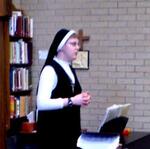 This evening, as we were praying vespers, one of the antiphons struck a chord with me, reminding me of a song I learned during my college years: “To the King of ages, immortal and invisible, be all honor and glory, alleluia.” This song (paraphrased from 1 Timothy 1), has always been powerful in lifting my heart up in praise. Since praying the antiphon this evening, now, that song has been coming back into my mind - it’s kind of catchy. (Sometimes, not being able to get a song out of your head can be a good thing, too.) I was also struck this evening at how many times the prayers referred to God’s kingship. During this time of seemingly unprecedented realities, this “age” of physical distancing, wearing masks, staying home, and rising numbers of ‘confirmed cases,’ it is good to remember that Jesus is truly the king of ALL ages. He is with us as he promised “even until the end of time.” Also, to quote another song we can remember that “He’s got the whole world in His hands.” This is good news which can inspire our hearts to break into praise even (or especially) during the “age” of COVID-19. “To the King of ages, immortal and invisible, be all honor and glory, alleluia.” |
Archives
October 2025
|



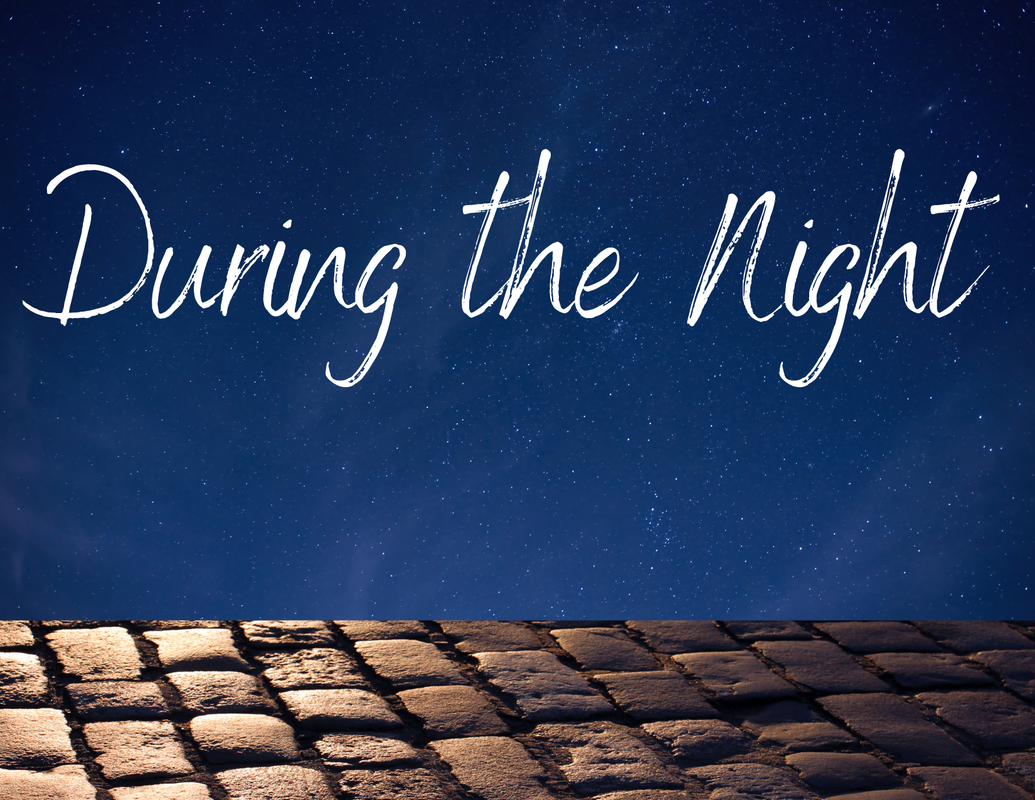
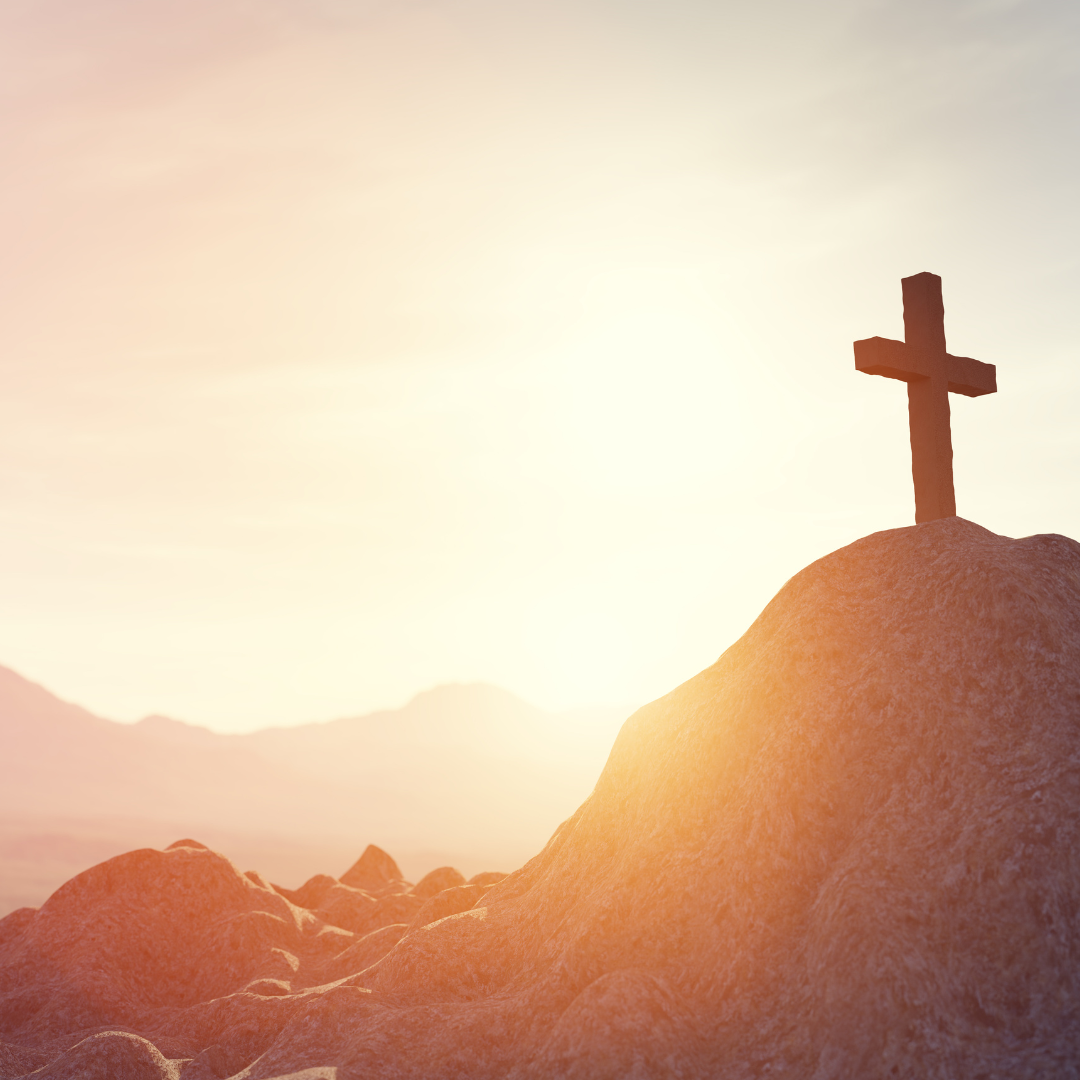
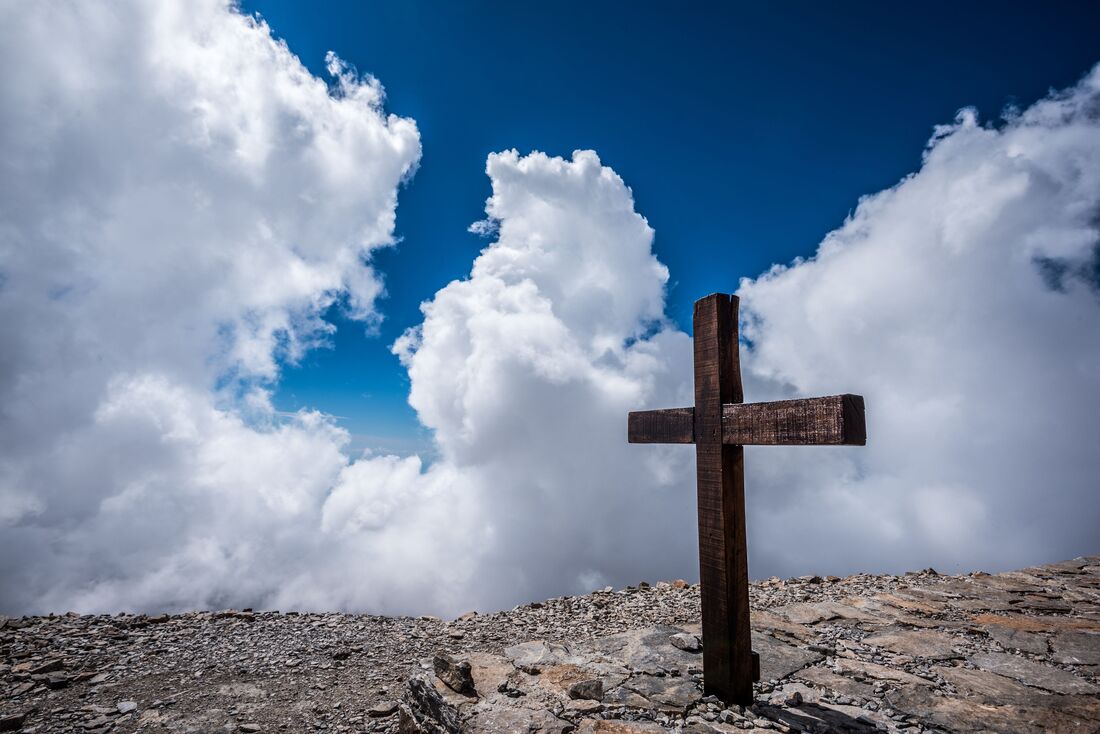
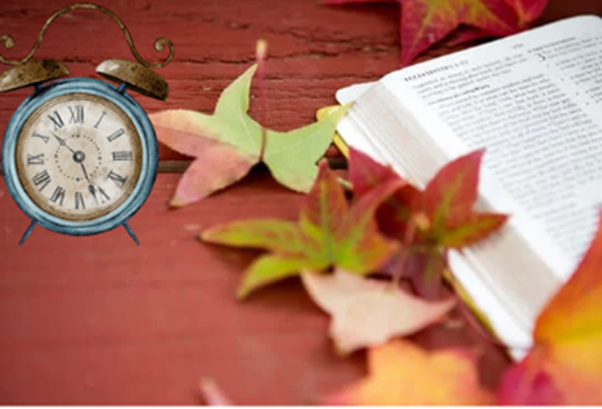





 RSS Feed
RSS Feed